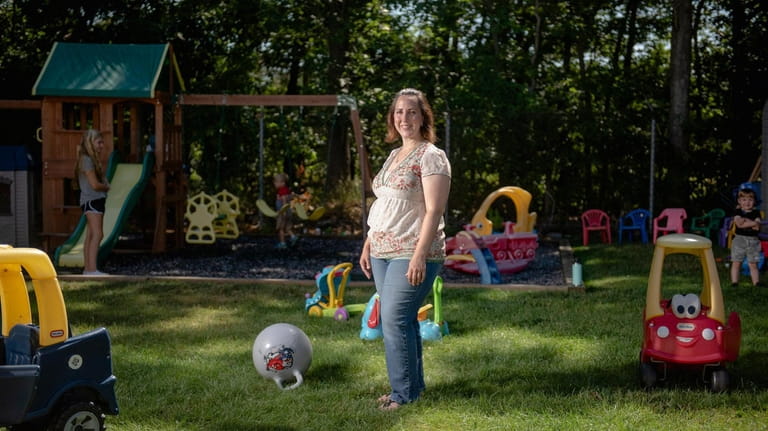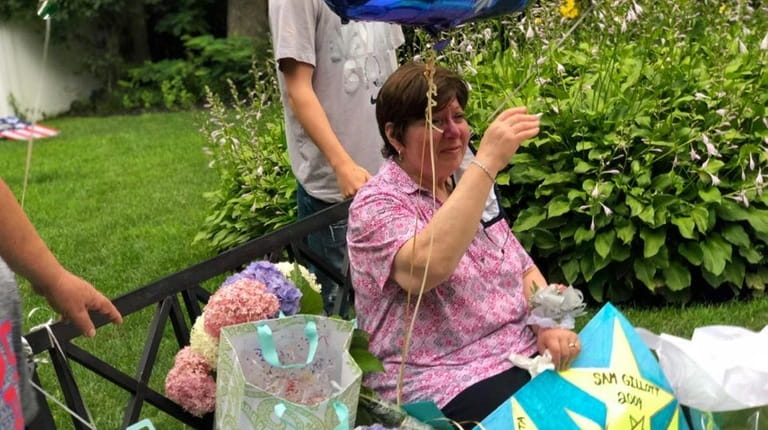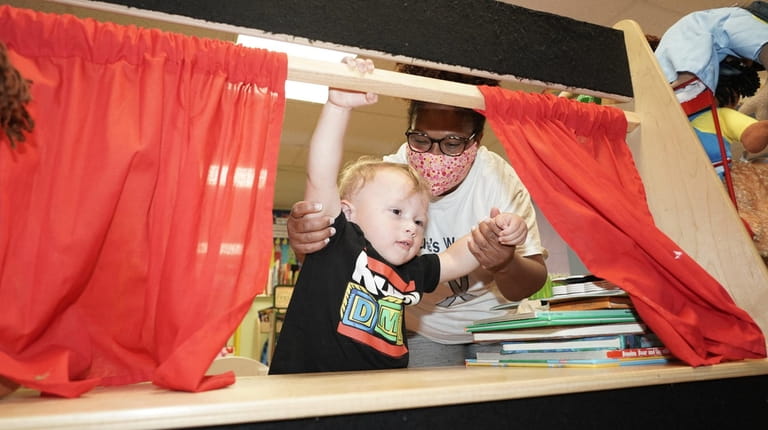Day care operators feel forgotten, and some are closing for good

Child care providers, whose services are critical to the reopening of Long Island's economy, say financial pressures created by the pandemic have put the survival of their businesses in jeopardy.
Their economic woes began in mid-March when Gov. Andrew M. Cuomo ordered the closure of all nonessential businesses.
Day care centers were deemed essential, but the order put thousands of parents out of work and sent thousands more to work from home.
Both groups kept their children home, depleting enrollment at hundreds of child care centers and resulting in providers having to return thousands of dollars in tuition.
Unless child care centers were caring for the children of health care workers, first responders and other essential workers, many had no choice but to temporarily shut their doors. About 35% of state-licensed and registered child care programs closed, according to the state.
Now, months later, even as Long Island has progressed through several phases of its reopening, child care providers say most parents remain too afraid of the coronavirus to send their kids to day care.
Another challenge? Adhering to new, costly safety regulations, including reduced class sizes and personal protective equipment for staff, which operators say cut into their already slim margins.
"These are just some of the countless challenges child care providers on Long Island are facing right now," Jennifer Marino Rojas, executive director of the Child Care Council of Suffolk Inc., said.
"A lot of them have had to close temporarily, but what's even worse is that because of the lack of income and the lack of support, many of them — providers who've been in the child care industry for years — won't be able to open again."
Rojas said the closures will leave a void that could encourage unlicensed day cares to pop up or worsen the problem of "child care deserts" — areas lacking accessible quality child care.
As of May, there were 1,770 licensed and registered child care programs on Long Island, with the average yearly cost of care ranging from $15,000 to $18,000 per child, Rojas said.
'A slap on the face'
In late June, Cuomo said $65 million in federal funds obtained through the CARES Act would be used to reopen and expand day care in New York.
"By providing support for expanded classrooms that allow for more social distancing and other resources, we can help keep staff and children safe," Cuomo said then.
The funding includes $20 million to help child care businesses pay for construction to expand, rent new space, or pay for materials such as partitions to support social distancing. It also includes $45 million to cover certain increased operating costs, such as supplies and staffing.
To be eligible for the funds, child care programs must have either been closed as of June 15 and had a plan to reopen within two weeks of applying, or have been operating below their licensed capacity and want to expand.
"This help is great and all, but where does it leave me?" Bayport day care operator Michele Kessler said.

Michele Kessler, pictured at her home-based day care center in Bayport, applied for a federal loan but was turned down. Credit: Johnny Milano
Kessler, 38, who owns the home-based An Apple a Daycare, said despite having to lay off two people, her business never closed.
"It's honestly a slap on the face to me, and to all the other child care providers in my same situation, who remained open. It feels like we're somehow being punished," said Kessler, who opened the day care four years ago when her daughter was born and is now four months pregnant with her second child.
"I applied for a PPP [Paycheck Protection Program] loan, they ran my credit and disqualified me, and my credit is good, it just wasn't good enough. ... Had my husband not been working, I would've already lost my house."
Kessler, whose business is licensed to care for 16 children, said she also got by partly because she required parents who were still employed to pay 50% tuition "to hold their children's spots" during the time they did not require care.
Alyssa Wenzel, of Sayville, whose daughter Penelope attended Kessler’s day care before the pandemic said she’s unsure when the 4-year-old will return.
Wenzel, who before the outbreak worked at a company that makes and installs window displays for retailers, was on maternity leave in mid-March when nonessential businesses were ordered to close. Since then, she’s been home — working only a few hours twice a week — and taking care of both children.
“I’m definitely still nervous [about COVID-19] and would prefer to shelter the kids as long as possible” said Wenzel, 31. "We still don’t know enough about this disease to let our guard down.”
But if she's required to return to the office full time, “I’d have no choice but to send them back,” she said.
“I do feel better that it’s a small day care and not one of those larger ones, but you just never know. … You don’t know how much social distancing the other families practice.”
Saying 'bye' forever

Jennifer Villacci, co-founder of Reach for the Stars preschool and day care in Ridge, waves at former students in a surprise "goodbye" car parade. Credit: Dawn Dorsa
For Dawn Villacci Dorsa, co-owner of Reach for the Stars preschool and day care in Ridge, the financial aid is too little, too late.
The center, which she opened alongside her mother, Jennifer Villacci, nearly 20 years ago, had seven classrooms and provided child care for 82 families, she said.
"Back in March, when we closed ... we all thought it was just temporarily," Dorsa, 43, said.
"We never, in a million years, imagined we were saying bye to the kids forever. But the more time went on, the more it just became inevitable."
Dorsa said some suddenly unemployed parents asked for refunds of monthly prepayments. "Of course, we didn't have the heart not to refund them," she said.
"We tried everything. We tried getting a loan, we tried starting a GoFundMe page, we hired a lawyer. But it was all to no avail, there was no catching up from this. ... Bills just piled on."
Dorsa said rent on the facility was about $15,000 a month.
"That's not including utilities, payroll and a host of other costs. We laid off our 20 employees and told them to go on unemployment," she said.
"Everything about this is heartbreaking. This was a dream for us, and now we feel like we've let everyone down and we're grieving."
Two weeks ago, Reach for the Stars held a going-out-of-business sale, liquidating all of the school's furniture, books and toys.
"We got rid of everything. ... I only kept the sign."
Closed centers shift demand
Kessler of An Apple a Daycare said she knows of at least five other day cares in Suffolk that have recently closed for good.
"I'm already feeling the impact," she said. "I've had to turn away about eight families seeking infant care."
Licensed day cares have caps on the number of infants, toddlers and school-age children they can enroll and must adhere to strict provider-to-child ratios set by the state's Office of Children and Family Services.
Ratio requirements were not altered by the outbreak, but to ensure social distancing, the number of children allowed in a group or classroom was reduced to 10 from as many as 18 for some age groups.
That forced many centers to choose between hiring additional staff and turning away business.
Earlier this month, the number of children allowed in one group was increased from 10 to 15.
"If I take that 16th child, I'd have to promote someone on staff to 'lead teacher,' " Kessler said. "Of course, I want to take more children, but sometimes it just doesn't make financial sense."
'This is all I know'
A few weeks ago, after running the numbers, Sharon Gonzalez's accountant advised her to go into a different field. Easier said than done. For two decades, Gonzalez, 54, owner of Littlefoot Day Care in Deer Park, has known "no other life than to take care of children."
"I converted half of my house into a day care," she said. "This is all I know. I have to stay open one way or the other."
All of the six families she provided care for "up and left" after COVID-19 hit.
Two parents were laid off and the rest started working from home, she said. "Now everyone's home, they don't need child care anymore," Gonzalez said.
"All of the parents have called me to say they'd like me to watch their children but only if no other child attends. They're all scared."
Gonzalez said other than occasionally watching her neighbor's daughter, she's been out of work since March 20.
"I thought of applying for one of those federal grants, but it said on the application I had to have a plan to reopen within two weeks of filing it. Well, I can plan all I want, but if parents don't want to bring their kids here ... then what?"
Gonzalez applied for a different loan: a $15,000 New York Forward Loan, aimed at supporting the recovery of the state's small businesses.
"I'm really hoping I get it. I just need something to help me make it through," she said.

Darcy Leone of Lake Ronkonkoma has been running Darcy's Tots for more than 30 years. Credit: Debbie Egan-Chin
In Lake Ronkonkoma, Darcy Leone, owner of Darcy's Tots, a day care with over 30 years in business, said she feels Gonzalez's pain.
"One day I was taking care of eight children and the next, I was down by seven," she said.
I keep saying, 'It's going to get better, it's going to get better, we've held on this long,' but the truth is, no one really knows what's gonna happen."
Among the most damaging blows to her business, Leone says, is an emergency child care program which is being run following Cuomo's executive order mandating school districts to establish and submit plans on how they would provide care for the children of essential workers.
Through the SCOPE Emergency Child Care Program — a program run by Smithtown-based nonprofit SCOPE Education Services — essential workers are eligible for free child care.
"Parents who were essential workers started to pull their kids from day care and put them in SCOPE because they knew they could take them for free," she said.
"I lost almost all of my kids; another nearby day care lost six kids. How could we compete with that? That hurt us tremendously. It's like we were suddenly just completely forgotten, like we didn't exist."
Unwilling to lose children to SCOPE, Leone, a representative for the Suffolk chapter of CSEA/VOICE — an 1,800-member, statewide union for child care providers — said she told parents she'd watch their children for free, too.
Leone said she preferred the children be "where I knew they'd be well taken care of, with me."
Regarding the financial feasibility of offering free care, Leone, who also cares for some of her own grandchildren at Darcy's Tots, said, "What can I say? It's an emotional business. I'm just thankful for my husband and his job."
'Something's got to give'
Lisa Price, owner of the 19-year-old Little Wonder Family Day Care in West Hempstead, said when the pandemic hit, child care providers were forgotten and ignored.
"Before the outbreak, I was taking care of 12 children. Now, I only have five," she said. "Financially, we're all hurting. Providers are either closing or caring for only one or two children. Something's got to give."
The pandemic has exposed the many, far-reaching flaws in New York's child care system, said Jan Barbieri, executive director of the Child Care Council of Nassau.
Providers are barely able to make a profit during the best of circumstances, she said, so it should come as no surprise that in the worst of circumstances, they're scrambling to get by.
"Our entire child care system needs to be looked at and redesigned; it's broken," Barbieri said. "Care givers are in dire need of help, acknowledgment, support, guidance, but most of all right now, financial assistance."
